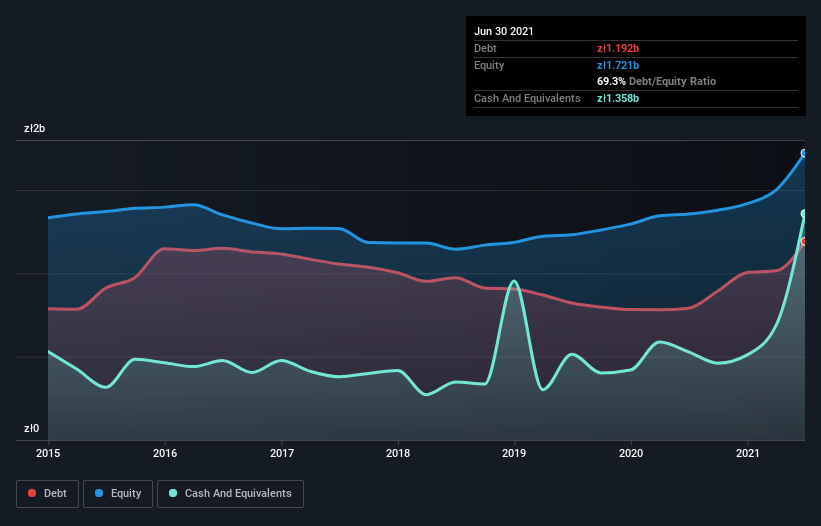The external fund manager backed by Berkshire Hathaway's Charlie Munger, Li Lu, makes no bones about it when he says 'The biggest investment risk is not the volatility of prices, but whether you will suffer a permanent loss of capital.' So it seems the smart money knows that debt - which is usually involved in bankruptcies - is a very important factor, when you assess how risky a company is. We can see that Polenergia S.A. (WSE:PEP) does use debt in its business. But the more important question is: how much risk is that debt creating?
What Risk Does Debt Bring?
Debt and other liabilities become risky for a business when it cannot easily fulfill those obligations, either with free cash flow or by raising capital at an attractive price. Part and parcel of capitalism is the process of 'creative destruction' where failed businesses are mercilessly liquidated by their bankers. However, a more common (but still painful) scenario is that it has to raise new equity capital at a low price, thus permanently diluting shareholders. Of course, plenty of companies use debt to fund growth, without any negative consequences. When we examine debt levels, we first consider both cash and debt levels, together.
See our latest analysis for Polenergia
What Is Polenergia's Debt?
You can click the graphic below for the historical numbers, but it shows that as of June 2021 Polenergia had zł1.19b of debt, an increase on zł791.1m, over one year. However, its balance sheet shows it holds zł1.36b in cash, so it actually has zł166.1m net cash.

How Healthy Is Polenergia's Balance Sheet?
According to the last reported balance sheet, Polenergia had liabilities of zł1.21b due within 12 months, and liabilities of zł1.42b due beyond 12 months. Offsetting these obligations, it had cash of zł1.36b as well as receivables valued at zł399.1m due within 12 months. So it has liabilities totalling zł873.6m more than its cash and near-term receivables, combined.
Polenergia has a market capitalization of zł4.24b, so it could very likely raise cash to ameliorate its balance sheet, if the need arose. However, it is still worthwhile taking a close look at its ability to pay off debt. While it does have liabilities worth noting, Polenergia also has more cash than debt, so we're pretty confident it can manage its debt safely.
The good news is that Polenergia has increased its EBIT by 3.6% over twelve months, which should ease any concerns about debt repayment. The balance sheet is clearly the area to focus on when you are analysing debt. But it is future earnings, more than anything, that will determine Polenergia's ability to maintain a healthy balance sheet going forward. So if you want to see what the professionals think, you might find this free report on analyst profit forecasts to be interesting.
Finally, a company can only pay off debt with cold hard cash, not accounting profits. Polenergia may have net cash on the balance sheet, but it is still interesting to look at how well the business converts its earnings before interest and tax (EBIT) to free cash flow, because that will influence both its need for, and its capacity to manage debt. Over the last three years, Polenergia reported free cash flow worth 4.4% of its EBIT, which is really quite low. That limp level of cash conversion undermines its ability to manage and pay down debt.
Summing up
Although Polenergia's balance sheet isn't particularly strong, due to the total liabilities, it is clearly positive to see that it has net cash of zł166.1m. On top of that, it increased its EBIT by 3.6% in the last twelve months. So we don't have any problem with Polenergia's use of debt. The balance sheet is clearly the area to focus on when you are analysing debt. However, not all investment risk resides within the balance sheet - far from it. Case in point: We've spotted 4 warning signs for Polenergia you should be aware of, and 3 of them can't be ignored.
At the end of the day, it's often better to focus on companies that are free from net debt. You can access our special list of such companies (all with a track record of profit growth). It's free.
New: Manage All Your Stock Portfolios in One Place
We've created the ultimate portfolio companion for stock investors, and it's free.
• Connect an unlimited number of Portfolios and see your total in one currency
• Be alerted to new Warning Signs or Risks via email or mobile
• Track the Fair Value of your stocks
This article by Simply Wall St is general in nature. We provide commentary based on historical data and analyst forecasts only using an unbiased methodology and our articles are not intended to be financial advice. It does not constitute a recommendation to buy or sell any stock, and does not take account of your objectives, or your financial situation. We aim to bring you long-term focused analysis driven by fundamental data. Note that our analysis may not factor in the latest price-sensitive company announcements or qualitative material. Simply Wall St has no position in any stocks mentioned.
Have feedback on this article? Concerned about the content? Get in touch with us directly. Alternatively, email editorial-team (at) simplywallst.com.
About WSE:PEP
Polenergia
Engages in the generation, distribution, trading, and sale of electricity in Poland and internationally.
Moderate growth potential with low risk.
Similar Companies
Market Insights
Community Narratives



